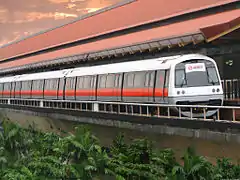Kawasaki Heavy Industries & CRRC Qingdao Sifang CT251
The trains manufactured by Kawasaki Heavy Industries & CRRC Qingdao Sifang (formerly CSR Qingdao Sifang) under Contract T251 (CT251) are the rolling stock used on Singapore's Thomson–East Coast line.
Kawasaki Heavy Industries & CRRC Qingdao Sifang CT251
| |
|---|---|
 Interior of one of the driving motor cars. | |
| In service | 31 January 2020– Present |
| Manufacturer | Kawasaki Heavy Industries CRRC Qingdao Sifang |
| Built at | Qingdao, Shandong, China |
| Constructed | 2015 – 2020 |
| Entered service | 31 January 2020 |
| Number under construction | 364 vehicles (91 trainsets) |
| Number built | 364 vehicles (91 trainsets) |
| Number in service | 36 vehicles (9 trainsets) |
| Formation | 4 per trainset DM1-M-T-DM2 |
| Fleet numbers | 2001 – 2091 |
| Capacity | 1,280 passengers |
| Operator(s) | SMRT Trains (SMRT Corporation) |
| Depot(s) | Mandai East Coast (Future) |
| Line(s) served | TEL Thomson–East Coast line |
| Specifications | |
| Car body construction | Welded Aluminium Construction |
| Car length | 23.6 m (77 ft 5 1⁄8 in) (DM) 22.8 m (74 ft 9 5⁄8 in) (M/T) |
| Width | 3.2 m (10 ft 6 in) |
| Height | 3.7 m (12 ft 1 5⁄8 in) |
| Doors | 1,450 mm (57 1⁄8 in), 10 per car, 5 per side |
| Maximum speed | 100 km/h (62 mph) (design) 90 km/h (56 mph) (service) |
| Weight | 153 t (151 long tons; 169 short tons) (unladen) 40 t (39 long tons; 44 short tons) (unladen DM/M) 33 t (32 long tons; 36 short tons) (unladen T) |
| Traction system | Mitsubishi Electric hybrid SiC-SBD IGBT-VVVF[1][2] |
| Electric system(s) | 750 V DC third rail[3] |
| Current collection method | Collector shoe |
| UIC classification | Bo'Bo' + Bo'Bo' + 2'2' + Bo'Bo' |
| Safety system(s) | Alstom Urbalis 400 Moving Block CBTC ATC with subsystems of ATO GOA 4 (UTO), ATP, Iconis ATS and SmartlockCBI[4][5][6] |
| Coupling system | Scharfenberg |
| Track gauge | 1,435 mm (4 ft 8 1⁄2 in) standard gauge |
91 four-car medium-capacity trainsets were purchased by LTA for the Thomson-East Coast line and the first set was delivered on 25 May 2018.[3]
Seven additional trains were supposed to be procured for the RTS Link as both the Singapore and Malaysian governments agreed to both lines sharing largely identical technical specifications.[7] Since then, a new agreement signed on 30 July 2020 meant that these trains would not be built and will be replaced by LRT trains.
Tender
The tender for trains under the contract turnkey 251 was closed on 15 November 2013 with six bids. The Land Transport Authority has shortlisted all of them and the tender results were published on 28 May 2014.[8][9]
| S/N | Name of tenderer | Amount (S$)[9] |
|---|---|---|
| 1 | Alstom Transport S.A. – Alstom Transport (S) Pte Ltd Consortium | 954,410,000 |
| 2 | Kawasaki Heavy Industries, Ltd. / Kawasaki Heavy Industries (Singapore) Pte Ltd & CRRC Qingdao Sifang (formerly CSR Qingdao Sifang) Consortium | 749,840,000 |
| 3 | Hyundai Rotem | 765,856,000 |
| 4 | Bombardier (Singapore) Pte Ltd, Bombardier Transportation GmbH & Changchun Bombardier Railway Vehicles Company Ltd Consortium | 810,179,619 |
| 5 | Construcciones Y Auxilliar De Ferrocarriles, S. A. | 939,645,996 |
| 6 | CRRC Zhuzhou Locomotive (formerly CSR Zhuzhou Electric Locomotive Co., Ltd.) / Siemens Pte Ltd, Singapore Consortium | 849,623,569 |
Kawasaki will be responsible for the overall project management, design, manufacturing of bogies and procurement of major components. CRRC Qingdao Sifang will be in charge of manufacturing, final fitting and assembly of complete MRT trains and factory testing. Kawasaki (Singapore) will be responsible for the delivery of complete MRT trains to the depot, on-site testing and commissioning.[3]
Design and features

The CT251 trains will have a new livery of khaki and brown stripes running around the cars, similar to C951 trains, which bear teal and dark blue stripes. They include several features unique to this rolling stock, such as:[10]
- LTA's new passenger information display, which is Train Vision supplied by Mitsubishi Electric;
- Perch seats which are located at the ends of each train car;
- Tip-up seats in 60 of the 91 trainsets;[11]
- Hand grips utilising joints instead of straps, providing commuters a steadier grip;
- 10 doors per car (5 per side), instead of 8 doors (4 per side).
Two of the CT251 trains would also be fitted with the automatic track inspection system, comprising cameras, lasers and sensors which would help to detect defects on the tracks, such as rail cracks, missing track-rail fasteners or even foreign objects.[11]
Train formation
The configuration of a CT251 in revenue service is DM1-M-T-DM2.
| Cars of CT251 | ||||||||||
|---|---|---|---|---|---|---|---|---|---|---|
| Car type | Control cab | Motor | Collector shoe | Car length | Wheelchair bay | |||||
| mm | ft in | |||||||||
| DM1 | ✓ | ✓ | ✓ | ✗ | ||||||
| DM2 | ✓ | ✓ | ✓ | ✗ | ||||||
| M | ✗ | ✓ | ✓ | ✓ | ||||||
| T | ✗ | ✗ | ✓ | ✓ | ||||||
The car numbers of the trains range from 2001x to 2091x, where x depends on the carriage type. Individual cars are assigned a five-digit serial number. A complete four-car trainset consists of one trailer (T), one motor car (M) and two driving motor cars (DM1 & DM2) permanently coupled together. For example, set 2001 consists of carriages 20011, 20012, 20013 and 20014.
- The first digit is always a 2.
- The second digit is always a 0.
- The third digit and fourth digit identifies the set number.
- The fifth digit identifies the car number, where the first car has a 1, the second has a 2, the third has a 3 and the fourth has a 4.
- Kawasaki Heavy Industries & CRRC Qingdao Sifang (formerly CSR Qingdao Sifang) built sets 001-091.
Doubts about the consortium
The award of the CT251 turnkey contract to the Kawasaki Heavy Industries & CRRC Qingdao Sifang (formerly CSR Qingdao Sifang) consortium was briefly politicised in Singapore, when the defects from the relatively new C151A trains constructed by the same consortium were made public on 5 July 2016. This was after Gerald Giam from the Workers Party commenting through an official Facebook post doubting the decision by the Land Transport Authority to awarded the subsequent contracts, specifically both the design and supply of C151C and CT251 rail cars to the same consortium in 2015.[12] This was despite the Land Transport Authority and operator SMRT Trains being officially acknowledged on the C151A crack defects as early as 2013.[13][14]
References
- "#TELTheFullPicture". Retrieved 2019-02-27.
- "MITSUBISHI ELECTRIC Semiconductors & Devices: Product Information | Power Modules [SiC Power Modules]". www.mitsubishielectric.com. Retrieved 2019-07-08.
- Singapore Government, Land Transport Authority (28 May 2014). "Kawasaki Heavy Industries, Ltd/CRRC Qingdao Sifang Co. Ltd/Kawasaki Heavy Industries (Singapore) Pte. Ltd. Consortium Awarded Prestigious Contract Worth $749 million" (Press release).
- 2020-01-31T15:53:00+00:00. "Singapore's Thomson–East Coast metro line opens". Railway Gazette International. Archived from the original on 16 June 2020. Retrieved 2020-06-15.
- "GE Transportation Chosen by Singapore's Land Transport Authority (LTA) To Supply the Signaling of New Thomson and Eastern Region Lines". Archived from the original on 11 March 2017. Retrieved 20 October 2017.
- "Singapore's LTA selects GE Transportation for driverless CBTC solution". Railway Technology. 7 May 2014. Archived from the original on 5 August 2017. Retrieved 6 March 2016.
- hermesauto (2018-01-16). "7 things to know about the upcoming Johor Baru-Singapore Rapid Transit System Link". The Straits Times. Retrieved 2018-05-29.
- TENDER INFORMATION - Land Transport Authority, 28 May 2014
- CONTRACT T251 - Land Transport Authority
- "Kawasaki Heavy Industries & CRRC Qingdao Sifang CT251". SGTrains. Retrieved 2019-07-08.
- "Kawasaki Heavy Industries & CRRC Qingdao Sifang CT251". Land Transport Guru.
- So the vendor's dismal track record can become a point in their favour? - Gerald Giam Facebook page, 8 July 2016 9:35am (GMT+8)
- "Defects on SMRT trains 'not safety-critical', to be repaired by manufacturer: LTA". Retrieved 2016-07-05.
- "26 China-made MRT trains sent back to fix defects". The Straits Times. Retrieved 5 July 2016.
External links
| Wikimedia Commons has media related to Kawasaki CT251. |

.jpg.webp)